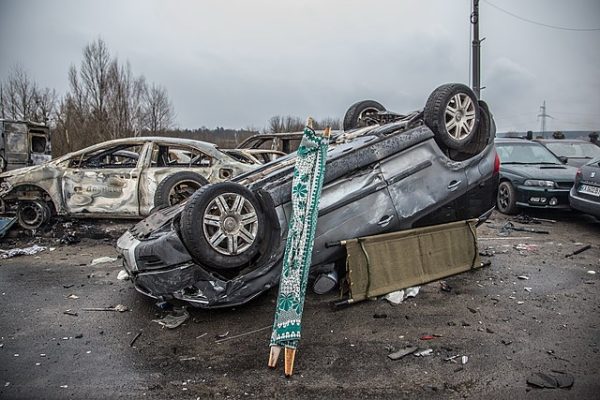
Bucha after the Russian invasion of Ukraine. Oleksandr Ratushniak | Wikimedia Commons
Charlie Trumbull
Staff Writer
In an era where information travels at light speed, modern genocides often occur under the radar. It is a common thought that, because genocide is hardly seen on social media, it simply does not happen and genocide is a thing of the past. The truth is that these contemporary atrocities are happening more often.
Today, the official overseer of international genocides is the non-profit Genocide Watch. The organization is dedicated to the prediction and prevention of genocide with an emphasis on ending any current crimes against humanity.
According to their 2024 report “Genocide Emergencies and Warnings,” 13 countries are currently perpetrating mass murders. Some are popularly covered in Western media, such as the Russian targeted attacks on Ukrainian civilians, Chinese mass detention camps for Uyghur Muslims, and the Israeli settlement’s expansion into Palestine. Some lesser-known genocides are occurring in Sudan, Nigeria, Afghanistan, Syria, North Korea, Myanmar, Bangladesh, India, Ethiopia and the Democratic Republic of Congo.
These statistics cancel out the common myth that genocides are a thing of the past. Many Americans are undereducated on the most deadly genocide of all time: the Holocaust. According to the United States Holocaust Memorial Museum (USHMM), 20 states do not have laws or guidelines that encourage or require the teaching of the Holocaust. Those who were not specifically educated on the topic most likely think that genocide is something that happened in Germany back in the 1940s. Genocide is not a historical phenomenon.
Another common myth is the belief that the international community will always act to prevent or stop genocides.
The United Nations was founded after World War II and, in a perfect world, it would be the governing body that intervened in times of genocide. However, this is never the case. Bureaucratic challenges often prevent states from aiding victims. Issues like a lack of consensus, limited awareness, or even moral ambiguity slow down political action.
While 13 recognized genocides wage on, Genocide Watch also warns that five more could be on the horizon perpetrated by Azerbaijan, India, Pakistan, Iran and Iranian-backed terrorism by Houthis in Yemen and Hezbollah in Lebanon. A “genocide warning” is an alert when there are credible signs that a genocide may occur based on the ten stages of genocide.
There is a strong moral imperative to act against injustice and genocide. The USHMM believes that improving genocide prevention begins with “individuals joining together to pledge to build a different future.”

